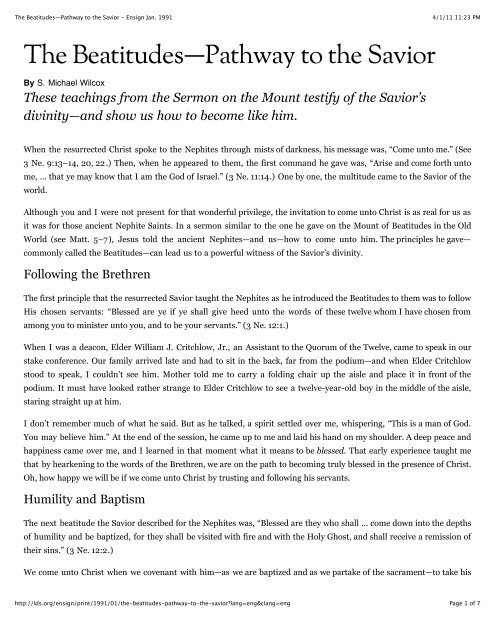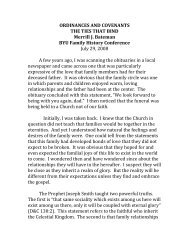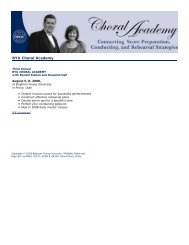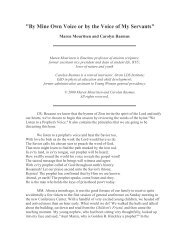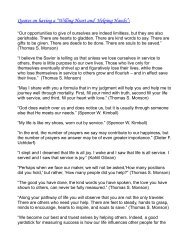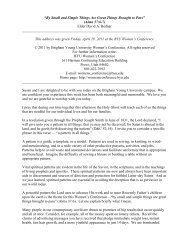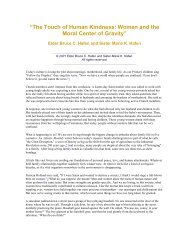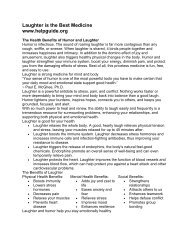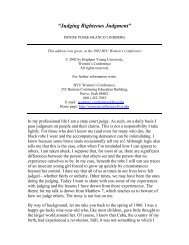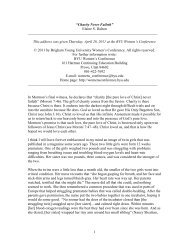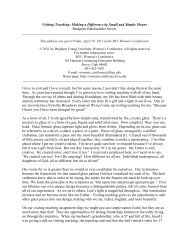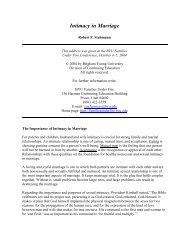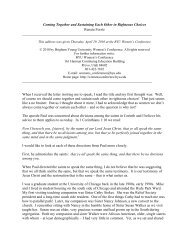The Beatitudes—Pathway to the Savior - Ensign Jan. 1991
The Beatitudes—Pathway to the Savior - Ensign Jan. 1991
The Beatitudes—Pathway to the Savior - Ensign Jan. 1991
You also want an ePaper? Increase the reach of your titles
YUMPU automatically turns print PDFs into web optimized ePapers that Google loves.
<strong>The</strong> <strong>Beatitudes—Pathway</strong> <strong>to</strong> <strong>the</strong> <strong>Savior</strong> - <strong>Ensign</strong> <strong>Jan</strong>. <strong>1991</strong><br />
<strong>The</strong> <strong>Beatitudes—Pathway</strong> <strong>to</strong> <strong>the</strong> <strong>Savior</strong><br />
By S. Michael Wilcox<br />
<strong>The</strong>se teachings from <strong>the</strong> Sermon on <strong>the</strong> Mount testify of <strong>the</strong> <strong>Savior</strong>’s<br />
divinity—and show us how <strong>to</strong> become like him.<br />
http://lds.org/ensign/print/<strong>1991</strong>/01/<strong>the</strong>-beatitudes-pathway-<strong>to</strong>-<strong>the</strong>-savior?lang=eng&clang=eng<br />
4/1/11 11:23 PM<br />
When <strong>the</strong> resurrected Christ spoke <strong>to</strong> <strong>the</strong> Nephites through mists of darkness, his message was, “Come un<strong>to</strong> me.” (See<br />
3 Ne. 9:13–14, 20, 22.) <strong>The</strong>n, when he appeared <strong>to</strong> <strong>the</strong>m, <strong>the</strong> first command he gave was, “Arise and come forth un<strong>to</strong><br />
me, … that ye may know that I am <strong>the</strong> God of Israel.” (3 Ne. 11:14.) One by one, <strong>the</strong> multitude came <strong>to</strong> <strong>the</strong> <strong>Savior</strong> of <strong>the</strong><br />
world.<br />
Although you and I were not present for that wonderful privilege, <strong>the</strong> invitation <strong>to</strong> come un<strong>to</strong> Christ is as real for us as<br />
it was for those ancient Nephite Saints. In a sermon similar <strong>to</strong> <strong>the</strong> one he gave on <strong>the</strong> Mount of Beatitudes in <strong>the</strong> Old<br />
World (see Matt. 5–7), Jesus <strong>to</strong>ld <strong>the</strong> ancient Nephites—and us—how <strong>to</strong> come un<strong>to</strong> him. <strong>The</strong> principles he gave—<br />
commonly called <strong>the</strong> Beatitudes—can lead us <strong>to</strong> a powerful witness of <strong>the</strong> <strong>Savior</strong>’s divinity.<br />
Following <strong>the</strong> Brethren<br />
<strong>The</strong> first principle that <strong>the</strong> resurrected <strong>Savior</strong> taught <strong>the</strong> Nephites as he introduced <strong>the</strong> Beatitudes <strong>to</strong> <strong>the</strong>m was <strong>to</strong> follow<br />
His chosen servants: “Blessed are ye if ye shall give heed un<strong>to</strong> <strong>the</strong> words of <strong>the</strong>se twelve whom I have chosen from<br />
among you <strong>to</strong> minister un<strong>to</strong> you, and <strong>to</strong> be your servants.” (3 Ne. 12:1.)<br />
When I was a deacon, Elder William J. Critchlow, Jr., an Assistant <strong>to</strong> <strong>the</strong> Quorum of <strong>the</strong> Twelve, came <strong>to</strong> speak in our<br />
stake conference. Our family arrived late and had <strong>to</strong> sit in <strong>the</strong> back, far from <strong>the</strong> podium—and when Elder Critchlow<br />
s<strong>to</strong>od <strong>to</strong> speak, I couldn’t see him. Mo<strong>the</strong>r <strong>to</strong>ld me <strong>to</strong> carry a folding chair up <strong>the</strong> aisle and place it in front of <strong>the</strong><br />
podium. It must have looked ra<strong>the</strong>r strange <strong>to</strong> Elder Critchlow <strong>to</strong> see a twelve-year-old boy in <strong>the</strong> middle of <strong>the</strong> aisle,<br />
staring straight up at him.<br />
I don’t remember much of what he said. But as he talked, a spirit settled over me, whispering, “This is a man of God.<br />
You may believe him.” At <strong>the</strong> end of <strong>the</strong> session, he came up <strong>to</strong> me and laid his hand on my shoulder. A deep peace and<br />
happiness came over me, and I learned in that moment what it means <strong>to</strong> be blessed. That early experience taught me<br />
that by hearkening <strong>to</strong> <strong>the</strong> words of <strong>the</strong> Brethren, we are on <strong>the</strong> path <strong>to</strong> becoming truly blessed in <strong>the</strong> presence of Christ.<br />
Oh, how happy we will be if we come un<strong>to</strong> Christ by trusting and following his servants.<br />
Humility and Baptism<br />
<strong>The</strong> next beatitude <strong>the</strong> <strong>Savior</strong> described for <strong>the</strong> Nephites was, “Blessed are <strong>the</strong>y who shall … come down in<strong>to</strong> <strong>the</strong> depths<br />
of humility and be baptized, for <strong>the</strong>y shall be visited with fire and with <strong>the</strong> Holy Ghost, and shall receive a remission of<br />
<strong>the</strong>ir sins.” (3 Ne. 12:2.)<br />
We come un<strong>to</strong> Christ when we covenant with him—as we are baptized and as we partake of <strong>the</strong> sacrament—<strong>to</strong> take his<br />
Page 1 of 7
<strong>The</strong> <strong>Beatitudes—Pathway</strong> <strong>to</strong> <strong>the</strong> <strong>Savior</strong> - <strong>Ensign</strong> <strong>Jan</strong>. <strong>1991</strong><br />
name upon us.<br />
http://lds.org/ensign/print/<strong>1991</strong>/01/<strong>the</strong>-beatitudes-pathway-<strong>to</strong>-<strong>the</strong>-savior?lang=eng&clang=eng<br />
4/1/11 11:23 PM<br />
Once when President George Albert Smith was seriously ill, he lost consciousness and thought he had died. He found<br />
himself standing near a beautiful lake. Soon he began following a trail through <strong>the</strong> woods, and after a time he saw a<br />
man, whom he recognized as his grandfa<strong>the</strong>r, coming <strong>to</strong>ward him.<br />
“I remember how happy I was <strong>to</strong> see him coming,” President Smith said. “I had been given his name and had always<br />
been proud of it.<br />
“When Grandfa<strong>the</strong>r came within a few feet of me, … he looked at me very earnestly and said:<br />
“‘I would like <strong>to</strong> know what you have done with my name.’<br />
“Everything I had ever done passed before me as though it were a flying picture on a screen—everything I had done. …<br />
I smiled and looked at my grandfa<strong>the</strong>r and said:<br />
“‘I have never done anything with your name of which you need be ashamed.’<br />
“He stepped forward and <strong>to</strong>ok me in his arms.” (Improvement Era, Mar. 1947, p. 139.)<br />
One day each of us may stand before <strong>the</strong> <strong>Savior</strong> and long <strong>to</strong> embrace him. I can picture him saying: “When you were<br />
baptized, you <strong>to</strong>ok upon yourself my name. What have you done with my name?” We should strive <strong>to</strong> live in such a way<br />
that we can answer, “I have never done anything with your name of which you need be ashamed.”<br />
<strong>The</strong> Poor in Spirit<br />
After teaching <strong>the</strong>se two primary beatitudes, explaining that we come un<strong>to</strong> him by being baptized and receiving <strong>the</strong> gift<br />
of <strong>the</strong> Holy Ghost, Christ described <strong>the</strong> blessed state of those who receive <strong>the</strong> Spirit. He also reiterated <strong>the</strong> importance<br />
of humility in receiving his Spirit.<br />
“Blessed are <strong>the</strong> poor in spirit who come un<strong>to</strong> me,” he said, “for <strong>the</strong>irs is <strong>the</strong> kingdom of heaven.” (3 Ne. 12:3.) Not until<br />
we recognize that we are poor in spirit will we “come down in <strong>the</strong> depths of humility and be baptized.” We are blessed<br />
<strong>the</strong>reafter by being filled with <strong>the</strong> Lord’s Spirit. (See 3 Ne. 12:2.)<br />
President Ezra Taft Benson has said that “humility is an acknowledged recognition of our dependence on a higher<br />
power.” (<strong>The</strong> Teachings of Ezra Taft Benson, Salt Lake City: Bookcraft, 1988, p. 369.) <strong>The</strong> <strong>Savior</strong> and his prophets are<br />
great exemplars of this principle. “I can of mine own self do nothing,” Jesus said: “As I hear, I judge: and my judgment<br />
is just; because I seek not mine own will, but <strong>the</strong> will of <strong>the</strong> Fa<strong>the</strong>r which hath sent me.” (John 5:30.)<br />
Brigham Young said, “We are nothing only what <strong>the</strong> Lord makes us.” (In Journal of Discourses, 5:343.) And Moses<br />
said, “Now … I know that man is nothing, which thing I never had supposed.” (Moses 1:10.) In comparison with <strong>the</strong><br />
Fa<strong>the</strong>r’s richness of spirit, we are “poor” indeed.<br />
In my own life I feel <strong>the</strong> greatest humility when, as King Benjamin taught, I recognize that a lifetime of praise and<br />
service <strong>to</strong> God would leave me still an unprofitable servant. (See Mosiah 2:20–21.) Every faculty I possess—my ability<br />
<strong>to</strong> think and move, even <strong>the</strong> very air I brea<strong>the</strong>—is a gift <strong>to</strong> me from God. If I were <strong>to</strong> devote every moment of my life<br />
Page 2 of 7
<strong>The</strong> <strong>Beatitudes—Pathway</strong> <strong>to</strong> <strong>the</strong> <strong>Savior</strong> - <strong>Ensign</strong> <strong>Jan</strong>. <strong>1991</strong><br />
exclusively <strong>to</strong> his service, I would not be giving <strong>to</strong> God anything that was not already his.<br />
http://lds.org/ensign/print/<strong>1991</strong>/01/<strong>the</strong>-beatitudes-pathway-<strong>to</strong>-<strong>the</strong>-savior?lang=eng&clang=eng<br />
4/1/11 11:23 PM<br />
One Christmas, my Cub Scout son needed two dollars <strong>to</strong> make me a present. On Christmas morning, he was so excited<br />
about it that in spite of <strong>the</strong> many brightly wrapped packages with his name on <strong>the</strong>m, he insisted I open his present first.<br />
It was a pencil holder for my office—made from a jar covered with brightly colored macaroni. <strong>The</strong> two dollars bought<br />
pencils and erasers. I was pleased with his innocence and love. He <strong>the</strong>n eagerly turned <strong>to</strong> his own presents.<br />
In comparison with <strong>the</strong> bounteous gifts <strong>the</strong> Fa<strong>the</strong>r bes<strong>to</strong>ws upon us—life, <strong>the</strong> A<strong>to</strong>nement, <strong>the</strong> gospel, prophets,<br />
scriptures, temples—our gifts <strong>to</strong> him are like jars covered with macaroni. It’s <strong>the</strong> best we can do, and he accepts our<br />
efforts with pleasure. <strong>The</strong> realization of <strong>the</strong> difference between us and Him produces deep humility and blessedness.<br />
<strong>The</strong>y That Mourn<br />
“And again, blessed are all <strong>the</strong>y that mourn, for <strong>the</strong>y shall be comforted.” (3 Ne. 12:4.) I believe I have gained a greater<br />
insight in<strong>to</strong> this Beatitude since becoming a bishop. Bishops see a lot of tears—tears of guilt shed in confession, tears of<br />
grief over <strong>the</strong> death of a loved one, tears of part-member families longing for temple blessings, tears of parents crying<br />
for wayward children, tears of pain caused by old and weary bodies. I have discovered that a handkerchief is an<br />
indispensable item for a bishop. But although we can wipe tears from cheeks, it is ano<strong>the</strong>r matter <strong>to</strong> wipe <strong>the</strong>m from<br />
souls.<br />
I have found comfort in a promise made in John’s revelation: “And God shall wipe away all tears from <strong>the</strong>ir eyes; and<br />
<strong>the</strong>re shall be no more death, nei<strong>the</strong>r sorrow, nor crying, nei<strong>the</strong>r shall <strong>the</strong>re be any more pain.” (Rev. 21:4.)<br />
Jesus said, “I am … <strong>the</strong> beginning and <strong>the</strong> ending.” (Rev. 1:8.) He is <strong>the</strong> end of sorrow and <strong>the</strong> end of guilt. He is <strong>the</strong><br />
end of pain, death, suffering, sin, and tears. He is <strong>the</strong> beginning of joy, life, and peace. He is <strong>the</strong> beginning of healing,<br />
truth, and fulfillment. He is <strong>the</strong> end of mourning, <strong>the</strong> beginning of comfort.<br />
<strong>The</strong> Meek<br />
“Blessed are <strong>the</strong> meek,” said Jesus, “for <strong>the</strong>y shall inherit <strong>the</strong> earth.” (3 Ne. 12:5.) Moses was described as “very meek,<br />
above all <strong>the</strong> men which were upon <strong>the</strong> face of <strong>the</strong> earth” (Num. 12:3)—and yet he had great power. Jesus said of<br />
himself, “I am meek and lowly in heart” (Matt. 11:29)—but no man ever lived who possessed more power.<br />
A Church leader once <strong>to</strong>ured a facility that housed a huge hydraulic crushing machine that could reduce old cars in<strong>to</strong><br />
small cubes. For a demonstration, <strong>the</strong> guide asked <strong>the</strong> man <strong>to</strong> remove his watch. <strong>The</strong> opera<strong>to</strong>r <strong>the</strong>n placed it in <strong>the</strong><br />
machine and adjusted <strong>the</strong> controls, and <strong>the</strong> <strong>to</strong>p blade came crashing down, s<strong>to</strong>pping just a millimeter above <strong>the</strong> watch.<br />
Next <strong>the</strong> sides slammed <strong>to</strong>ge<strong>the</strong>r, but once again <strong>the</strong>y s<strong>to</strong>pped just shy of <strong>the</strong> crystal. <strong>The</strong>n <strong>the</strong> opera<strong>to</strong>r removed <strong>the</strong><br />
watch and returned it unscratched.<br />
Much pleased with <strong>the</strong> demonstration, this good man turned <strong>to</strong> those with him and said, “We have just witnessed <strong>the</strong><br />
greatest demonstration of meekness I have ever seen. Meekness is great power under complete control.”<br />
<strong>The</strong>y Who Hunger and Thirst after Righteousness<br />
“Blessed are all <strong>the</strong>y who do hunger and thirst after righteousness, for <strong>the</strong>y shall be filled with <strong>the</strong> Holy Ghost.” (3 Ne.<br />
Page 3 of 7
<strong>The</strong> <strong>Beatitudes—Pathway</strong> <strong>to</strong> <strong>the</strong> <strong>Savior</strong> - <strong>Ensign</strong> <strong>Jan</strong>. <strong>1991</strong><br />
4/1/11 11:23 PM<br />
12:6.) What is <strong>the</strong> righteousness for which man hungers and thirsts, and which, in its fulfillment, produces happiness?<br />
Lehi and Nephi saw in vision <strong>the</strong> tree of life, “whose fruit was desirable <strong>to</strong> make one happy.” (1 Ne. 8:10.) Each word<br />
describing <strong>the</strong> fruit—sweet, white, desirable, beautiful, precious, and joyous—is used in terms of comparison: <strong>The</strong> fruit<br />
is not just sweet, but “most sweet, above all.” Its whiteness exceeds “all … whiteness.” It is “desirable above all o<strong>the</strong>r<br />
fruit.” Its beauty is “far beyond, yea, exceeding of all beauty.” It is “precious above all,” and “most joyous <strong>to</strong> <strong>the</strong> soul.” (1<br />
Ne. 8:11–12; 1 Ne. 11:8–9, 23.)<br />
When some disciples left him, Jesus asked <strong>the</strong> Twelve, “Will ye also go away?”<br />
Peter answered: “Lord, <strong>to</strong> whom shall we go? thou hast <strong>the</strong> words of eternal life.” (John 6:67–68.)<br />
We come <strong>to</strong> Christ when we realize, as did Peter, that nothing can satisfy or bring happiness like <strong>the</strong> <strong>Savior</strong>’s tree of life<br />
and stream of living water.<br />
<strong>The</strong> Merciful<br />
“Blessed are <strong>the</strong> merciful, for <strong>the</strong>y shall obtain mercy.” (3 Ne. 12:7.) Mercy is <strong>the</strong> quality of soul necessary for<br />
forgiveness; those who forgive o<strong>the</strong>rs will be forgiven of <strong>the</strong>ir own offenses. Recognizing our own shortcomings makes<br />
it easier <strong>to</strong> extend mercy <strong>to</strong> o<strong>the</strong>rs.<br />
Jesse W. Crosby related an experience he had one day in Nauvoo when he <strong>to</strong>ok a woman <strong>to</strong> see <strong>the</strong> Prophet Joseph<br />
Smith. When she complained that someone was telling untruths about her, <strong>the</strong> Prophet “offered her his method of<br />
dealing with such cases for himself. When an enemy had <strong>to</strong>ld a scandalous s<strong>to</strong>ry about him, which had often been done,<br />
before he rendered judgment he paused and let his mind run back <strong>to</strong> <strong>the</strong> time and place and setting of <strong>the</strong> s<strong>to</strong>ry <strong>to</strong> see if<br />
he had not by some unguarded word or act laid <strong>the</strong> block on which <strong>the</strong> s<strong>to</strong>ry was built. If he found that he had done so,<br />
he said that <strong>the</strong>n in his heart he <strong>the</strong>n forgave his enemy, and felt thankful that he had received warning of a weakness<br />
that he had not known he possessed. <strong>The</strong>n he said <strong>to</strong> <strong>the</strong> sister that he would have her <strong>to</strong> do <strong>the</strong> same: search her<br />
memory thoroughly and see if she had not herself all unconsciously laid <strong>the</strong> foundation for <strong>the</strong> scandal that annoyed<br />
her.”<br />
<strong>The</strong> sister “thought deeply for a few moments and <strong>the</strong>n confessed that she believed that she had. <strong>The</strong>n <strong>the</strong> Prophet <strong>to</strong>ld<br />
her that in her heart she could forgive that bro<strong>the</strong>r who had risked his own good name and her friendship <strong>to</strong> give her<br />
this clearer view of herself. <strong>The</strong> sister … thanked her advisor and went away in peace.” (In “S<strong>to</strong>ries from Notebook of<br />
Martha Cox, Grandmo<strong>the</strong>r of Fern Cox Anderson,” typescript, Church Archives.)<br />
If we can learn <strong>to</strong> turn our eye inward—even when we feel that <strong>the</strong> major offense lies elsewhere—we will find ourselves<br />
more able <strong>to</strong> forgive and <strong>to</strong> extend mercy. We will become more like Christ.<br />
<strong>The</strong> Pure in Heart<br />
“Blessed are all <strong>the</strong> pure in heart, for <strong>the</strong>y shall see God.” (3 Ne. 12:8.) Several verses in scripture speak of seeing God:<br />
Moses “sought diligently <strong>to</strong> sanctify his people that <strong>the</strong>y might behold <strong>the</strong> face of God.” (D&C 84:23.) <strong>The</strong> <strong>Savior</strong><br />
promised that “every soul who forsaketh his sins and cometh un<strong>to</strong> me, and calleth on my name, and obeyeth my voice,<br />
and keepeth my commandments, shall see my face and know that I am.” (D&C 93:1.) Likewise we are <strong>to</strong>ld <strong>to</strong> have an<br />
http://lds.org/ensign/print/<strong>1991</strong>/01/<strong>the</strong>-beatitudes-pathway-<strong>to</strong>-<strong>the</strong>-savior?lang=eng&clang=eng<br />
Page 4 of 7
<strong>The</strong> <strong>Beatitudes—Pathway</strong> <strong>to</strong> <strong>the</strong> <strong>Savior</strong> - <strong>Ensign</strong> <strong>Jan</strong>. <strong>1991</strong><br />
4/1/11 11:23 PM<br />
eye “single <strong>to</strong> [God’s] glory” and <strong>to</strong> “sanctify yourselves that your minds become single <strong>to</strong> God, and <strong>the</strong> days will come<br />
that you shall see him.” (D&C 88:67–68.) <strong>The</strong> purity needed <strong>to</strong> see God involves obedience, sanctification, and having<br />
an eye single <strong>to</strong> God’s glory.<br />
<strong>The</strong> scriptures contain numerous examples of people who reached <strong>the</strong> necessary purity of heart and were able <strong>to</strong> see<br />
God or his messengers and converse with <strong>the</strong>m. <strong>The</strong> attitude <strong>the</strong>y exhibited as <strong>the</strong>y did so gives a beautiful picture of<br />
purity:<br />
On <strong>the</strong> road <strong>to</strong> Damascus, Paul said, “What wilt thou have me <strong>to</strong> do?” (Acts 9:6.) <strong>The</strong> boy Samuel, as instructed by Eli,<br />
said, “Speak; for thy servant heareth.” (1 Sam. 3:10.) Nephi said, “I will go and do” (1 Ne. 3:7) and “I must obey” (2 Ne.<br />
33:15). And Mary said, “Behold <strong>the</strong> handmaid of <strong>the</strong> Lord; be it un<strong>to</strong> me according <strong>to</strong> thy word.” (Luke 1:38.)<br />
A common thread runs through each of <strong>the</strong>se statements—an attitude of obedience, a purity of motive, and desire <strong>to</strong> do<br />
<strong>the</strong> will of <strong>the</strong> Lord. <strong>The</strong> eye is single <strong>to</strong> <strong>the</strong> Lord’s will and glory.<br />
<strong>The</strong> Peacemakers<br />
“Blessed are all <strong>the</strong> peacemakers, for <strong>the</strong>y shall be called <strong>the</strong> children of God.” (3 Ne. 12:9.) To understand how <strong>to</strong> be a<br />
peacemaker, it is necessary <strong>to</strong> know what brings peace. Paul explained that “<strong>the</strong> fruit of <strong>the</strong> Spirit is love, joy, peace,<br />
longsuffering, gentleness, goodness, faith.” (Gal. 5:22.) Where <strong>the</strong> Spirit of <strong>the</strong> Lord is, <strong>the</strong>re is peace. A peacemaker is<br />
one who invites <strong>the</strong> Spirit; <strong>the</strong>n <strong>the</strong> Spirit grants <strong>the</strong> peace.<br />
President Heber J. Grant <strong>to</strong>ld <strong>the</strong> s<strong>to</strong>ry of two men who had quarreled about business dealings. <strong>The</strong>y came <strong>to</strong> President<br />
John Taylor and asked him <strong>to</strong> settle <strong>the</strong> matter. President Taylor consented, but said: “‘Brethren, before I hear your<br />
case, I would like very much <strong>to</strong> sing one of <strong>the</strong> songs of Zion for you.’<br />
“Now President Taylor was a very capable singer, and interpreted sweetly and with spirit, our sacred hymns. He sang<br />
one of our hymns <strong>to</strong> <strong>the</strong> two brethren. Seeing its effect, he remarked that he never heard one of <strong>the</strong> songs of Zion but<br />
that he wanted <strong>to</strong> listen <strong>to</strong> one more, and so asked <strong>the</strong>m <strong>to</strong> listen while he sang ano<strong>the</strong>r. Of course, <strong>the</strong>y consented.<br />
<strong>The</strong>y both seemed <strong>to</strong> enjoy it.”<br />
<strong>The</strong>n President Taylor sang a third and a fourth hymn. When he finished, <strong>the</strong> two men “were melted <strong>to</strong> tears, got up,<br />
shook hands, and asked President Taylor <strong>to</strong> excuse <strong>the</strong>m … for taking up his time. <strong>The</strong>y <strong>the</strong>n departed without his even<br />
knowing what <strong>the</strong>ir difficulties were.” (Improvement Era, Sept. 1940, p. 522.)<br />
This principle can work in our marriages, families, and o<strong>the</strong>r relationships. <strong>The</strong> ultimate source of peace is <strong>the</strong> Fa<strong>the</strong>r<br />
and <strong>the</strong> Son. Those who invite <strong>the</strong> Spirit of <strong>the</strong> Lord in<strong>to</strong> <strong>the</strong>ir lives and homes are peacemakers. And when we teach<br />
one ano<strong>the</strong>r and <strong>the</strong> world <strong>the</strong> Lord’s plan of salvation, we become peacemakers and children of “<strong>the</strong> founder of peace,<br />
yea, even <strong>the</strong> Lord, who has redeemed his people.” (Mosiah 15:18.)<br />
<strong>The</strong>y Who Are Persecuted<br />
“Blessed are all <strong>the</strong>y who are persecuted for my name’s sake, for <strong>the</strong>irs is <strong>the</strong> kingdom of heaven.” (3 Ne. 12:10.) It is<br />
difficult <strong>to</strong> understand how undergoing persecution can make us happy. Perhaps <strong>the</strong> blessedness comes in facing <strong>the</strong><br />
http://lds.org/ensign/print/<strong>1991</strong>/01/<strong>the</strong>-beatitudes-pathway-<strong>to</strong>-<strong>the</strong>-savior?lang=eng&clang=eng<br />
Page 5 of 7
<strong>The</strong> <strong>Beatitudes—Pathway</strong> <strong>to</strong> <strong>the</strong> <strong>Savior</strong> - <strong>Ensign</strong> <strong>Jan</strong>. <strong>1991</strong><br />
persecution as <strong>the</strong> prophets did. Joseph Smith, for example, described what he felt persecution had done for him:<br />
http://lds.org/ensign/print/<strong>1991</strong>/01/<strong>the</strong>-beatitudes-pathway-<strong>to</strong>-<strong>the</strong>-savior?lang=eng&clang=eng<br />
4/1/11 11:23 PM<br />
“I am like a huge, rough s<strong>to</strong>ne rolling down from a high mountain; and <strong>the</strong> only polishing I get is when some corner<br />
gets rubbed off by coming in contact with something else, striking with accelerated force against religious bigotry,<br />
priestcraft, lawyer-craft, doc<strong>to</strong>r-craft, lying edi<strong>to</strong>rs, suborned judges and jurors, and <strong>the</strong> authority of perjured<br />
executives, backed by mobs, blasphemers, licentious and corrupt men and women—all hell knocking off a corner here<br />
and a corner <strong>the</strong>re. Thus I will become a smooth and polished shaft in <strong>the</strong> quiver of <strong>the</strong> Almighty.” (Teachings of <strong>the</strong><br />
Prophet Joseph Smith, sel. Joseph Fielding Smith, Salt Lake City: Deseret Book Co., 1938, p. 304.)<br />
Joseph Smith realized that opposition and persecution can refine and polish. James said, “<strong>The</strong> trying of your faith<br />
worketh patience.” (James 1:3.) Patience is <strong>the</strong> realization that all things give us experience (see D&C 122:7) and can<br />
turn our hearts <strong>to</strong> Christ.<br />
A Light <strong>to</strong> All <strong>the</strong> World<br />
By living <strong>the</strong> life <strong>the</strong> <strong>Savior</strong> described, we have <strong>the</strong> potential <strong>to</strong> be a light <strong>to</strong> o<strong>the</strong>rs. “I give un<strong>to</strong> you <strong>to</strong> be <strong>the</strong> light of<br />
this people,” Jesus said. (3 Ne. 12:14.) <strong>The</strong> world must see <strong>the</strong> blessedness that such a life brings—not just our good<br />
works, but also <strong>the</strong> joy those works produce. <strong>The</strong>y should see that if <strong>the</strong>y come un<strong>to</strong> Christ, <strong>the</strong>y, <strong>to</strong>o, can receive such<br />
happiness.<br />
A Broken Heart<br />
Jesus concluded this portion of his Nephite sermon by repeating his invitation <strong>to</strong> come un<strong>to</strong> him: “I have given you <strong>the</strong><br />
law and <strong>the</strong> commandments of my Fa<strong>the</strong>r, that ye shall believe in me, and that ye shall repent of your sins, and come<br />
un<strong>to</strong> me with a broken heart and a contrite spirit.” (3 Ne. 12:19.)<br />
I have often pondered what it means <strong>to</strong> have a “broken” heart. When I was a boy, my uncle allowed me <strong>to</strong> help him<br />
break wild horses. We roped <strong>the</strong>m, placed a strong lea<strong>the</strong>r halter on <strong>the</strong>ir heads, and attached a heavy rope <strong>to</strong> it. <strong>The</strong>n<br />
we cinched <strong>the</strong> rope around a solid cedar post sunk deep in <strong>the</strong> earth. <strong>The</strong> young colts hated <strong>the</strong> rope and would fight it<br />
for days, setting <strong>the</strong>ir legs defiantly in <strong>the</strong> ground and straining with all <strong>the</strong>ir might against it. But <strong>the</strong>y hurt only<br />
<strong>the</strong>mselves. In time <strong>the</strong>y learned <strong>to</strong> accept <strong>the</strong> rope, and <strong>the</strong>n gradually we could approach <strong>the</strong>m and teach <strong>the</strong>m <strong>to</strong> be<br />
led. When my uncle could lay <strong>the</strong> rope loosely over his open palm, turn his back, and walk away with <strong>the</strong> horse<br />
following him, he would say, “This horse is broken.”<br />
A broken heart is a submissive heart, an obedient heart, a heart open <strong>to</strong> <strong>the</strong> <strong>Savior</strong>. Why would any of us ever hesitate<br />
<strong>to</strong> go where <strong>the</strong> Lord would lead us, knowing what price he has paid for us because of his love for us? Why would we<br />
ever want <strong>to</strong> pull <strong>the</strong> rope of our life away from Him?<br />
Elder Boyd K. Packer once said, “I went before [<strong>the</strong> Lord] and in essence said, ‘I’m not neutral, and You can do with me<br />
what You want. If You need my vote, it’s <strong>the</strong>re. I don’t care what You do with me, and You don’t have <strong>to</strong> take anything<br />
from me because I give it <strong>to</strong> You—everything, all I own, all I am.’” (“That All May be Edified,” Salt Lake City:<br />
Bookcraft, 1982, p. 272).<br />
Coming un<strong>to</strong> Christ<br />
Page 6 of 7
<strong>The</strong> <strong>Beatitudes—Pathway</strong> <strong>to</strong> <strong>the</strong> <strong>Savior</strong> - <strong>Ensign</strong> <strong>Jan</strong>. <strong>1991</strong><br />
4/1/11 11:23 PM<br />
<strong>The</strong> first time we <strong>to</strong>ok our three-year-old daughter <strong>to</strong> Temple Square, she showed me what it means <strong>to</strong> come un<strong>to</strong><br />
Christ. As we were going up <strong>the</strong> ramp in <strong>the</strong> North Visi<strong>to</strong>rs’ Center, she looked up and saw <strong>the</strong> statue of Jesus. She let<br />
go of my hand, looked in<strong>to</strong> my face, and with an expression of unutterable love and eagerness said, “Oh, Daddy! It’s<br />
Jesus!” She <strong>the</strong>n ran as fast as she could <strong>to</strong> meet him.<br />
<strong>The</strong> <strong>Savior</strong> himself said, “Whoso repenteth and cometh un<strong>to</strong> me as a little child, him will I receive, for of such is <strong>the</strong><br />
kingdom of God. Behold, for such I have laid down my life, and have taken it up again; <strong>the</strong>refore repent, and come un<strong>to</strong><br />
me ye ends of <strong>the</strong> earth, and be saved.” (3 Ne. 9:22.)<br />
[illustration] <strong>The</strong> Lord Jesus Christ, by Del Parson<br />
[illustration] <strong>The</strong> Sermon on <strong>the</strong> Mount, by James J. Tissot<br />
[illustrations] Illustrated by Lynn Farrar<br />
S. Michael Wilcox, bishop of <strong>the</strong> Draper Tenth Ward, Draper Utah North Stake, is an instruc<strong>to</strong>r at <strong>the</strong> LDS Institute of<br />
Religion adjacent <strong>to</strong> <strong>the</strong> University of Utah.<br />
Official Web site of <strong>The</strong> Church of Jesus Christ of Latter-day Saints<br />
© 2011 Intellectual Reserve, Inc. All Rights Reserved<br />
http://lds.org/ensign/print/<strong>1991</strong>/01/<strong>the</strong>-beatitudes-pathway-<strong>to</strong>-<strong>the</strong>-savior?lang=eng&clang=eng<br />
Page 7 of 7


